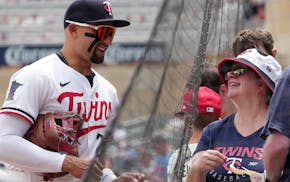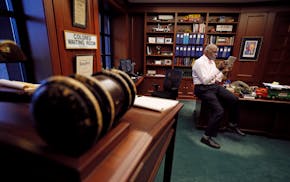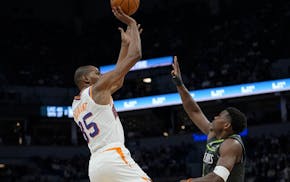Agitated Timberwolves fans whined for years about Karl-Anthony Towns complaining to referees.
When Towns was traded to the Knicks last fall and thrived this season, the ATF (Agitated Timberwolves Fans) suddenly missed KAT, but they found a new target for their angst: newcomer Julius Randle and his habit of running down the shot clock before making a decision with the ball.
The ATF were right about Towns, but they allowed their frustrations to skew their perception of his overall value as a tremendous offensive player, strong rebounder and improved defender.
The ATF were right about Randle for much of this season. He did dribble too much; he did delay making a decision for too long in many possessions; and he rarely looked comfortable in Wolves coach Chris Finch's offense.
Because of longstanding frustration with his style of play, and the fact that Towns was having a tremendous season in New York, Randle became the fans' convenient scapegoat.
In reality, Randle has been one of the Wolves' most effective and decisive players since returning from injury in early March. He has looked increasingly comfortable running the Wolves offense as a point forward, and making quicker decisions in the paint. He has adapted to Wolves star Anthony Edwards' style of play, and the two now look like they have been playing together for years.
When Randle returned from a right adductor strain on March 2, the Wolves were 33-29 and had lost two in a row. Since then, they are 17-4 and won eight of their last nine games to close the regular season.
Wolves President of Basketball Operations Tim Connelly had myriad reasons for trading Towns for Randle, Donte DiVincenzo and a first-round draft pick. He was eventually going to have to move either Towns, Edwards or Rudy Gobert for salary cap reasons, and Edwards is the Wolves' franchise player and Gobert is the key to their defense.
Money aside, there were two good basketball reasons for making the deal:
1. Getting two good players for one good player would improve the Wolves' depth, and the current Wolves regime has always valued DiVincenzo.
2. Towns is an exceptional offensive player, but he's not at his best when needing to create his own shot. The Wolves lost in the Western Conference finals last year to a Dallas team that relied on two playmakers — Luka Doncic and Kyrie Irving. The Mavericks always had at least one player on the court who could create for himself or teammates.
After months of adjusting to the Wolves, and watching from the sideline while injured, Randle has given Connelly what he wanted — a second player, along with Edwards, who can create his own shot, or draw defenders and make the right pass.
"He's willing to do whatever the team has needed," Finch said. "Donte arrived here as a 40-minutes-a-game starter in New York, down the stretch and into the playoffs. Julius has been a scorer his whole career. Those guys have really adjusted and found their roles here and at times propelled us during this season."
Finch said Randle is capable of playing any position on offense. He can bring the ball up the court, initiate offense, power to the rim, post up, hit three-pointers and create shots for teammates.
As the Wolves prepare for a playoff series against the Lakers, Randle's strength could play a major role on defense. The Wolves' two best on-the-ball defenders, Jaden McDaniels and Nickeil Alexander-Walker, aren't strong enough to play physically against Doncic and LeBron James without fouling. Randle might not be an ideal match for either, but he won't be overpowered by them.
Connelly's trade for Gobert looked terrible until Gobert's second season in Minnesota. Connelly's trade for Randle and DiVincenzo looked terrible early this season, when Towns was thriving and the new Wolves were overcoming the shock of being traded to the tundra.
Randle can alter the perceptions of even the most disgruntled fans over the next two weeks if he can help the Wolves upset the Luka-and-LeBron Lakers — if what we've seen the past six weeks is real.
Souhan: Could Jaire Alexander be the piece that elevates the Vikings to Super Bowl contenders?

Souhan: Twins wait to see if end of a slump you'd never expect is salve for an injury you'd never anticipate

Souhan: Anxiety and depression in the NFL helped inspire Lindsey Young's children's book
Souhan: For Lynx star Napheesa Collier, 'Phee' is just fine


